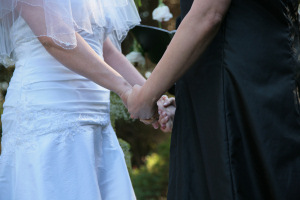Power of love at heart of ‘gay marriage’
14 Mar 2012
Legal rights and protections play second fiddle to the power of love for younger gay and lesbian couples who have formed civil partnerships, according to a three-year study by researchers at The University of Manchester.

Funded by the Economic and Social Research council (ESRC), the study finds same sex couples mostly enter into civil partnerships to express the loving nature of their relationship and long-term commitment to each other, their families and friends.
Based on in-depth interviews with 100 civil partners below the age of 35, the sociologists found they largely view and present themselves as ‘ordinary married’ couples like their heterosexual parents.
The specialist study examined the couples separately and together along with their biographies to reveal an otherwise unreachable insight into the lives of same sex couples.
One of the first research projects to acknowledge the impact of growing up with a sense of the acceptability and ordinariness of lesbian and gay relationships , it will form part of a book by Palgrave later this year.
“The same sex couples we studied often related to each other in a similar way that their heterosexual married parents would do,” said Professor Brian Heaphy who conducted the research along with his Manchester colleagues Professor Carol Smart and Dr Anna Einarsdottir.
“And like many heterosexual marriages, their relationships involve negotiating money management and debt, and juggling the demands of work and home life. For the most part they assume monogamous sexual and emotional commitments and are strongly connected to the families they grew up with.
“For the majority, legal ‘rights’ and protections were a secondary consideration in the decision to form a civil partnership.”
The project’s findings follow David Cameron proposals for full marriage rights for gay and lesbian couples last year.
Professor Heaphy added: “It’s fascinating how attitudes to same sex relationships are nowadays seen as a measure of your liberal credentials.
“Cameron’s comments would have been unthinkable for a senior Conservatives until very recently.
“As a result of civil partnerships and other changes, many young same sex couples are now have a feeling being ordinary in a way previous generations never did.
“The institution of heterosexual marriage no longer has the status it once had- which may explain why gay men and lesbians are able to buy into the notion being ‘married’ more easily.
“Most of the couples we studied saw themselves as married, and were mostly treated as such by their close circles, colleagues and officials.
“In this sense, civil partnership is already widely accepted as a form of marriage. Recent attempts by senior religious figures to stop same sex marriage miss this point.”
Couples subscribe, found the team, to broader cultural beliefs about good marriages based on love, enduring commitment, mutual care and support, sexual exclusivity, equality and respect, communication and stability.
Men, however, were less likely to see parenting as part of their future and immigration provided the impetus for eight couples to formalise their commitment, as did joint parenting for six of them.
Professor Heaphy is based at the University’s Morgan Centre for the Study of Relationships and Personal Life.
